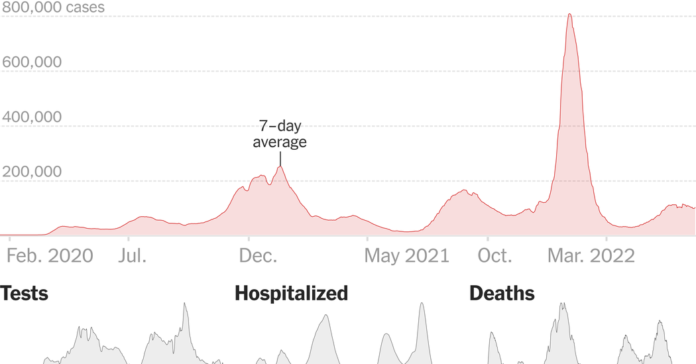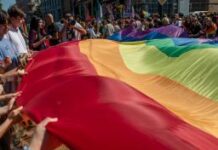
Monkeypox and the gay community
This weekend marks the end of Pride month, as cities across the country host events to celebrate the L.G.B.T.Q. community.
It is also a fraught moment in public health: A global outbreak of monkeypox is causing concern, with many of the cases clustered around men who have sex with men.
Experts are now trying to strike a delicate balance, warning people who may be at higher risk, without stigmatizing a community that has often been scapegoated for health scares in the past.
For more, I spoke to Gregg Gonsalves, an assistant professor of epidemiology at the Yale School of Public Health and a global health activist.
Why are many of the monkeypox cases in men who have sex with men?
It’s an epidemiological accident of history. This is not a gay disease; it has been circulating in West and Central Africa for many years. We have viral zoonoses that jump from animals to humans all the time.
What likely happened in this case is that somebody who had monkeypox had a lesion and showed up at a gay rave in Europe, and it spread to those in that social and sexual network. And because the virus prefers close physical contact as a means of transmission, it found a very suitable environment for which to propagate itself.
Is monkeypox sexually transmitted?
Not as far as we know right now, in terms of being transmitted by vaginal or seminal fluid. But sex involves close bodily contact. So it’s hard to pick apart what’s going on until we have more studies of the cases that have emerged so far across the world.
How should I think about my risk?
Monkeypox has found a foothold — not in all gay men — but in a certain subset of gay, bisexual and trans men who have been associated with these parties. That being said, the potential for it to move into other populations within the L.G.B.T.Q. community or further afield is possible.
People should know the facts. [The C.D.C. has a fact sheet about social gatherings and monkeypox.] We have 173 cases nationwide, but that’s likely to be the tip of the iceberg because it’s fairly difficult to get access to monkeypox testing, and we’re likely to have substantial spread among this network of gay men with multiple sexual partners in New York.
So, you know, people should be like, “OK, should I go out tonight to go dancing in a club or go to one of these big L.G.B.T.Q. pride events?” Think about it. If you’re going to go out and have sex, think about how you’re going to do it in what kind of setting, what kind of venue. If you’re going to go to a venue where you might end up having sex with multiple partners in one evening, think about that as well.
And think about your own health. If you have a fever or swollen glands or any sort of the early symptoms of monkeypox, and certainly if you see a lesion, you should go get tested and talk to your clinician. And don’t go to these events if you feel sick.
How is the L.G.B.T.Q. community responding?
This isn’t the L.G.B.T.Q. community’s first time at the rodeo, right? The gay community knows how to manage infectious disease. Remember the Provincetown outbreak of Covid in 2021? The gay community there sprung into action and helped the Massachusetts Department of Health and the C.D.C. do contact tracing, because they knew how to do this. Everybody swung into action and was completely essential to what was happening in that outbreak.
So while the nature of our social and sexual networks might have made us vulnerable to this infection and its spread, our resilience and our persistence against infectious disease threats for 40 years now also makes us a pretty able foe for the virus as well.
What should we be doing that we’re not?
We want to contain this outbreak. So it’s not just about educating people about managing your individual risk, it’s dealing with a new outbreak that we could potentially contain and snuff out before it embeds itself long term in the gay community. So this means we need all hands on deck. Public health departments and L.G.B.T.Q. and AIDS organizations should be cooperating and saying, we’re going to send our folks who do prevention outreach into the clubs, into the sex venues and to the Pride events.
Another lesson from the Covid pandemic: We need to act quickly. Getting vaccines out for this is going to be important, but Jynneos — which is the least problematic of the two major vaccines — is in short supply. Montreal has already started vaccinating men who have sex with men who have two or more sexual partners. New York City recently announced it would vaccinate men who have sex with men, too. But we have yet to do that broadly in the United States, so we’re behind the curve.
Maybe it’ll burn itself out, maybe it won’t. But unless we up our game, we are certainly heading down the path of letting this virus persist in our communities. The point is, there’s no time to lose now.
More on monkeypox:
What else we’re following
What you’re doing
The good news? We’re far past the “How dare they!?!” tension that dominated most of our pandemic lives. The bad news? It’s not because differences were resolved. Rather, those differences slowly eroded certain relationships until a deep canyon grew between them. The further they drift away, those at sea don’t very well care about what’s happening on shore. And so with us. Tension with our local church eroded into a breath of relief at joining a like-minded church elsewhere. Tension with defiant family members eroded into “I wonder if/when we’ll see so-and-so again.” Tension with those in our community who refused to put others first eroded into new friendships with some of the most compassionate people we’ve ever met. The tension is gone but in its place lies a vast and (perhaps) impassable canyon — a haunting, empty reminder of what once was full.
— Alan K., North Carolina
Let us know how you’re dealing with the pandemic. Send us a response here, and we may feature it in an upcoming newsletter.
Sign up here to get the briefing by email.
Email your thoughts to briefing@nytimes.com.








